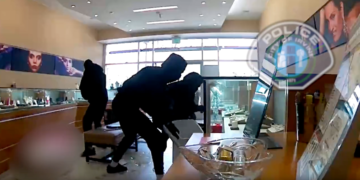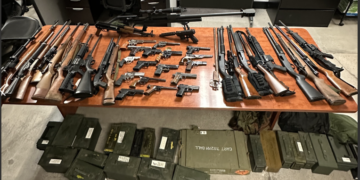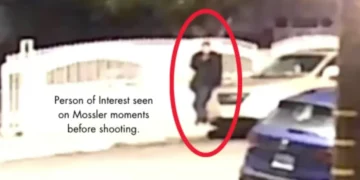LOS ANGELES, CA – California is implementing a series of new laws aimed at cracking down on retail theft and property crimes starting January 1, 2025. The legislation, signed by Governor Gavin Newsom, strengthens law enforcement’s ability to prosecute shoplifting, smash-and-grab robberies, and organized theft rings.
The new measures come amid rising concerns over the economic impact of retail theft, which costs California businesses approximately $20 billion annually, according to state estimates. Lawmakers say the reforms will close legal loopholes, extend probation periods, increase sentencing enhancements, and allow law enforcement to aggregate theft values to meet felony charges.
“These laws address today’s biggest challenges head-on,” Newsom said in a statement released on Monday. “We’re improving public safety, protecting businesses, and ensuring offenders are held accountable while creating opportunities for rehabilitation.”
The legislation includes specific bills targeting retail theft, organized crime, and property damage. The following bills outline the key reforms:
- AB 2943 – Introduced by Assemblymember Rick Chavez Zbur (D-Los Angeles), this law allows prosecutors to aggregate the value of stolen property from multiple incidents, victims, or across county lines to meet the $950 felony grand theft threshold. It grants police the authority to arrest suspects based on probable cause, even if the officer did not witness the theft. Additionally, it creates a new offense for possessing stolen goods valued at over $950 with intent to sell, exchange, or return them—punishable by up to three years in jail. It also extends probation periods for shoplifting and petty theft from one year to two years and establishes rehabilitative programs for defendants under 25.
- SB 905 – Authored by Senator Scott Wiener (D-San Francisco), this bill permits prosecutors to combine values of property stolen from vehicles over multiple incidents to charge suspects with automotive theft for resale. It also closes the loophole that required prosecutors to prove car doors were locked during vehicle burglaries, making it easier to prosecute auto theft cases.
- AB 3209 – Proposed by Assemblymember Marc Berman (D-Palo Alto), this law allows courts to issue “retail theft restraining orders” against offenders convicted of retail crimes, banning them from entering affected stores or their other locations for up to two years.
- AB 1802 – Introduced by Assemblymember Reginald Byron Jones-Sawyer (D-Los Angeles), this bill removes the expiration date for organized retail theft as a criminal offense and continues the regional property crime task force indefinitely, ensuring law enforcement has resources to investigate and prosecute organized theft rings.
- SB 1416 – Sponsored by Senator Josh Newman (D-Grand Terrace), this measure mandates enhanced sentencing for those involved in large-scale property resale operations that traffic in stolen goods.
- AB 1972 – Proposed by Assemblymember Juan Alanis (R-Modesto), this bill expands the regional property crimes task force’s jurisdiction to include cargo theft, addressing concerns about theft targeting distribution networks and supply chains.
- SB 1242 – Authored by Senator Dave Min, this law imposes stricter penalties on suspects who set fires to aid organized retail theft, targeting those who use arson as a means to evade capture or destroy evidence.
- AB 1960 – Introduced by Speaker Robert Rivas (D-Salinas), this measure increases sentencing enhancements for crimes involving theft, damage, or destruction of property valued at more than $50,000 during the commission of a felony.
- SB 1144 – Sponsored by Senator Nancy Skinner (D-Alameda), this bill requires online platforms to collect and verify information about high-volume third-party sellers to prevent the sale of stolen goods through online marketplaces.
- AB 1779 – Authored by Assemblymember Jacqui Irwin (D-Thousand Oaks), this measure allows prosecutors to consolidate theft charges and related offenses across different counties into a single case, enabling streamlined prosecutions for suspects committing crimes in multiple jurisdictions.
- AB 2943 (Additional Provisions) – This law also ensures that retailers are not penalized for repeatedly reporting theft incidents, removing any deterrent for businesses seeking law enforcement assistance.
The new legislation was signed into law in August 2024, just months before California voters approved Proposition 36, which reintroduces felony charges for drug possession and theft under $950 if the defendant has two or more prior convictions for theft or drug-related offenses.
Officials say the reforms represent a comprehensive approach to addressing retail crime, with an emphasis on accountability, rehabilitation, and preventive measures to tackle organized theft networks.
Law enforcement agencies and prosecutors across the state are expected to begin implementing these policies immediately in 2025, focusing on protecting businesses and detering repeat offenders.
Further updates will be provided as the laws take effect and their impact on property crime trends becomes clear in the coming months.


























